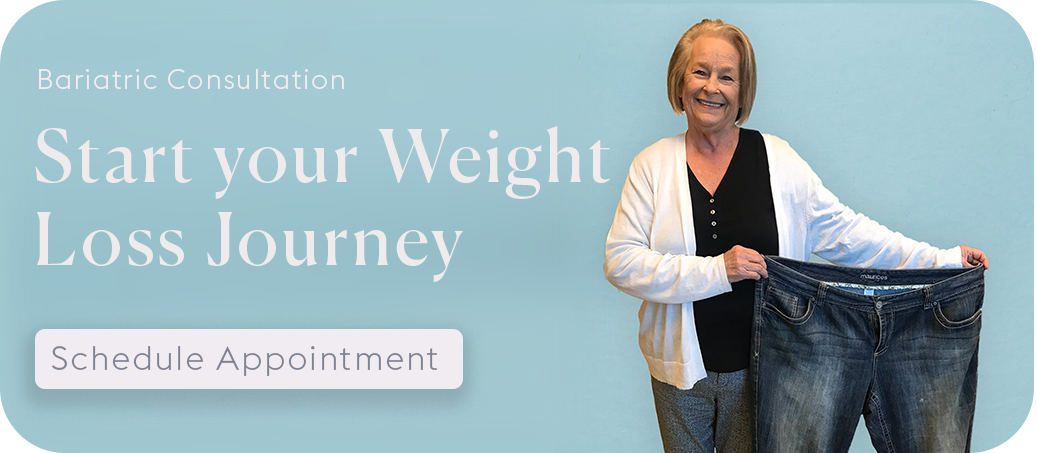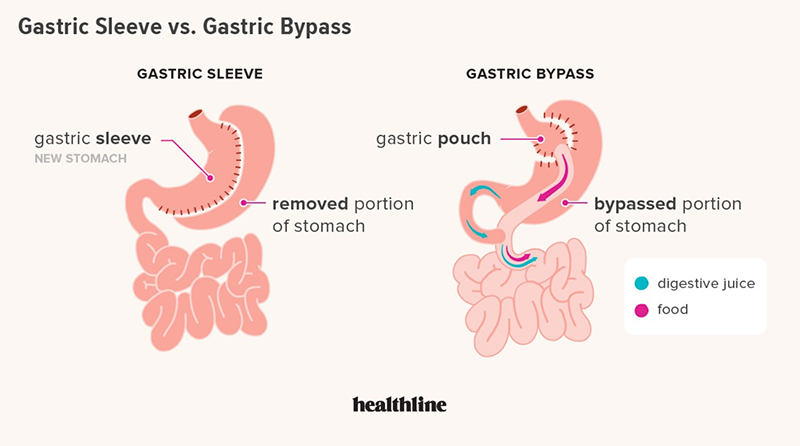There are four standard bariatric procedures that help patients lose a significant amount of weight and keep it off long term. These procedures are the Gastric Band, Gastric Bypass, Gastric Sleeve, and Duodenal Switch. There are some critical differences between these procedures and the risks and benefits vary for each operation. In this week’s blog, we’ll talk about expected weight loss after bariatric surgery.
The least invasive bariatric procedure is the gastric band, which involves placing a silicone band around the upper part of the stomach to restrict food consumption. The oldest staple bariatric procedure is the gastric bypass, although the gastric sleeve has gained popularity in recent years due to its perceived simplicity and safety. Yet aside from the bypass and the sleeve, a third staple bariatric procedure is emerging as an effective tool for bariatric patients with a higher body mass index (BMI) known as the duodenal switch.
All of these weight loss surgery procedures have various degrees of expected weight loss.
How to Measure Weight Loss after Bariatric Surgery
Before we jump into how much weight you will lose after weight loss surgery, it is important to understand how we compare weight loss results is as a percentage of excess weight loss (%EWL).
In other words, if a patient’s starting weight is 200 pounds and their goal weight is 100 pounds, then they are 100 pounds overweight. Therefore, if they lose 100 pounds after surgery, they will have lost 100% of their excess weight; and if they lose 50 pounds, they will have lost 50% of their excess weight.
To calculate the %EWL you will subtract your starting weight from your current weight, divide that by your excess weight, then multiply that result by 100 to get your percentage.
Keep in mind that good results from traditional dieting and exercise programs generally have a success rate of 5% to 10% EWL.

How Much Weight Will I Lose after Bariatric Surgery?
A question I often get asked by bariatric patients is, “how much weight will I lose?”. The short answer is it varies based on several factors, including age, genetics, gender, starting weight, and motivation level. Within my own practice, I have observed a few common generalizations that impact weight loss after bariatric surgery.
Gastric Band Expected Weight Loss
Patients who have the Gastric Band can expect to lose around 35 to 45% of their excess weight. If an individual loses about 40% of their excess weight with the Gastric Band, that is pretty good weight loss results.
However, if the patient loses more than ~40%, the band is likely too tight, and the patient is probably experiencing reflux and not eating in a routine and social way. Often this can result in having to have fluid removed from the band to loosen it, and unfortunately, when this happens, the patient will often regain a significant amount of weight.
Therefore, we do not often recommend the Gastric Band for our patients due to the unsatisfactory weight loss results.
Gastric Sleeve Expected Weight Loss
Most individuals can expect to lose somewhere between 60 to 75% of their excess weight with the gastric sleeve.
The patient’s starting body mass index (BMI) will determine how much weight they can expect to lose. Patients with a BMI in the 40s and 50s will lose a significant amount of weight; however, they will lose a smaller percentage of their excess weight. On the contrary, patients who started at a lower weight range (BMI in the 30s and 40s) will often lose close to 100% of their excess weight.
In general, though, we tell our patients they can expect to lose an average of 60 to 65% excess weight loss.
Duodenal Switch Expected Weight Loss
When comparing bariatric procedures based on expected weight loss, the Duodenal Switch sees the best overall weight loss results. Patients who have a Duodenal Switch can expect to lose somewhere in the 80 to 90% range and will often lose up to 100% of their excess weight.
So why not do this operation on everyone if it has the best weight loss results? Most of the time, this operation is too aggressive for patients who have a BMI in the 30s to 50s range and would likely find satisfactory results with the Gastric Bypass and the Gastric Sleeve. In general, we reserve the Duodenal Switch for patients whose BMI is well into the 50 and 60 range so they can maximize their weight loss.
Timeline of Weight Loss
- In the first 6 to 8 weeks after surgery, most patients (regardless of their procedure) will lose ~10% of their excess weight.
- In the following 4 to 5 months, they can expect to lose a total of ~50% of their excess weight.
- Over the next 12 months, patients will generally lose an additional 50% of their excess weight, equally a total of 100%.
After the first year of surgery, patients’ weight loss will typically begin to plateau. Generally speaking, patients can expect to hit their end weight, which is hopefully their goal weight, 18 months post-op.
Other Factors Affecting Weight Loss
Aside from the procedure you choose, the expected weight loss ranges stated above vary based on social and environmental factors. The amount of expected weight loss will depend on the patient’s commitment to the process and their commitment to making healthier food choices and increasing your overall activity level.
Similarly, expected weight loss can also be dependent on the patient’s environmental factors such as stress, lack of sleep, genetics, and gender. Due to the hormones that women produce, they will tend to lose about 10% less weight, and lose weight more slowly than men. Similarly, age will be a determining factor in expected weight loss. Young patients have a higher metabolism and therefore are more likely to lose most weight after their bariatric procedure.
Conclusion
For many patients who have tried and failed at traditional weight loss through diet and exercise, or who are concerned that their weight is out of control, weight loss surgery is the best solution for maximal and sustained weight loss. However, like any treatment, surgery is not fool-proof and results will vary based on each individual.
The patients who see the best long-term results are the ones who have a commitment to the process, change their eating habits, engage in regular physical activity, and develop habits to stay healthy. Surgery is a magic wand. Weight regain can occur when a person goes back to poor eating behaviors that involve the consumption of excessive amounts of carbohydrates.


